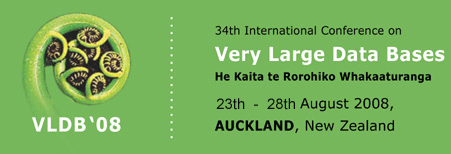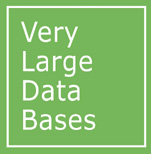

Welcome
PC Chairs message
Keynotes
Programme
Proceedings
Presentations
Accepted papers
Program committees
Conference officers
Important Dates
Guidelines for Authors
Submission
Workshops
CallsSponsorship
Co-located conferences
Registration
Venue
Auckland Airport Transport
Auckland Accommodation
Tourism
Conference Details
Conference video
Contact
Workshops
Contents
VLDB PhD Workshop
The VLDB PhD workshop is a forum for PhD students working in the broad areas addressed by the VLDB conference itself. This forum aims at facilitating interactions among PhD students and at stimulating feedback from more experienced researchers.
BIRTE08
In today's competitive and highly dynamic environment, analyzing data to understand how the business is performing, to predict outcomes and trends, and to improve the effectiveness of business processes underlying business operations has become critical. The traditional approach to reporting is not longer adequate, users now demand easy-to-use intelligent platforms and applications capable of analyzing real-time business data to provide insight and actionable information at the right time. The end goal is to improve the enterprise performance by better and timelier decision making, enabled by the availability of up-to-date, high quality information.
As a response, the notion of "real-time enterprise" has emerged and is beginning to be recognized in the industry. Gartner defines it as "using up-to-date information, getting rid of delays, and using speed for competitive advantage is what the real-time enterprise is all about... Indeed, the goal of the real-time enterprise is to act on events as they happen".
Although there has been progress in this direction and many companies are introducing products towards making this vision reality, there is still a long way to go. In particular, the whole lifecycle of business intelligence requires new techniques and methodologies capable of dealing with the new requirements imposed by the real-time enterprise. From the capturing of real-time business performance data to the injection of actionable information back into business processes, all the stages of the Business Intelligence (BI) cycle call for new algorithms and paradigms as the basis of new functionalities including dynamic integration of real-time data feeds from operational sources, evolution of ETL transformations and analytical models, and dynamic generation of adaptive real-time dashboards, just to name a few.
The series of BIRTE workshops aims to provide a forum to discuss topics related to this emerging field and set research directions of business intelligence (BI) toward the vision of the real-time enterprise.
Following the success of BIRTE 2006 held in Seoul, Korea in conjunction with VLDB 2006, submissions for research, position and experience papers on relevant topics are encouraged.
DBISP2P'08
The aim of the workshop is to explore the promise of P2P to offer exciting new possibilities in distributed information processing and database technologies. The realization of this promise lies fundamentally in the availability of enhanced services, such as structured ways for classifying and registering shared information, verification and certification of information, data distributed schemes and quality of contents, security features, information discovery and accessibility, semantic interoperation and composition of active information services, and finally market-based mechanisms to allow cooperative and non cooperative information exchanges. The P2P paradigm lends itself to constructing large scale complex, adaptive, autonomous and heterogeneous database and information systems, endowed with clearly specified and differential capabilities to negotiate, bargain, coordinate and self-organize the information exchanges in large scale networks. This vision will have a radical impact on the structure of complex organizations (business, scientific or otherwise) and on the emergence and the formation of social communities, and on how the information is organized and processed.
DMSN'08
The scope of the DMSN'08 workshop includes all important aspects of sensor data management, including data acquisition, processing, and storage in remote wireless networks; the handling of uncertain sensor data; and the management of heterogeneous and sometimes sensitive sensor data in databases. The resource-constrained, lossy, noisy, distributed, and remote nature of wireless sensor networks implies that traditional database techniques often cannot be applied without significant retooling. Challenges associated with acquiring, processing, and archiving large-scale, heterogeneous sets of live sensor data also call for novel data management techniques. The inherently incomplete and noisy nature of sensor data further calls for techniques for data cleaning, inference, approximation. Finally, in many applications, the collecting of sensor data raises important privacy and security concerns that require new protection and anonymization techniques.
MUD 2008
The aim of the workshop on Management of Uncertain Data is to provide a forum to share original ideas as well as research results and practical development experiences among researchers and application developers. In this workshop we want to explore the various aspects of uncertainty in data as well as techniques how to handle them in the domain of databases. In particular, we are interested in discussing the different kinds of uncertainty, different models for uncertainty representation in databases, techniques for querying and updating data involving uncertainty, and the various application areas in which handling uncertain data is involved.
NTII 2008
Information Integration is a well studied subject in academia. However, its use in practice is not as widespread as one would have expected - as per Gartner around 80% of the data in enterprises today is unstructured which is not integrated with the structured data. The reason for this gap between theory and practice is that researchers have explored the generic algorithms required to handle the problem of information integration. Each domain, however, has its own unique set of requirements and challenges which severely restrict the integration of structured and unstructured data in practice.
The aim of this workshop is to have an interactive gathering of researchers with a passion for information integration area. The workshop seeks to encourage researchers to present novel issues and techniques related to applying information integration in different areas (especially in the context of integrating structured and unstructured data). The workshop will serve to present new ideas to researchers which would help drive the research in information integration from being “generic” to being more focused and realistic.
ODBIS 2008
Ontologies serve as a means for establishing a conceptually concise basis for communicating knowledge in any context. They become a major conceptual backbone for a broad spectrum of activities dealing with databases either in information systems (IS) or in knowledge systems (KS). IS professionals and researchers have traditionally dealt with issues of identifying, capturing, and representing domain knowledge within information systems. In the structural dimension, ontologies can provide mechanisms for organizing and storing items including database schemes, user interface objects, and application programs. In the temporal dimension, ontologies can guide the development of new information systems by helping analysts and designers to choose appropriate processes, algorithms, rules, and software components depending upon their needs. A key point in databases is the ability to make data available semantically, that is, to find an automated and meaningful way of expressing their structure and semantics. Within this perspective, an approach is to search for a tool which will automatically create ontologies corresponding to the content of the database and make them available for humans and machines. On the other hand, due to their independence from lower level models, ontologies are used for integrating heterogeneous databases enabling interoperability and specifying interfaces to KS. Availability of the background knowledge stored in ontologies increases significantly the support which can be given for indexing as well as for searching. Ontologies may be useful too for conducting extraction tasks for discovering patterns, interpreting rules or conceptual clustering. Furthermore ontologies can be used to provide semantic annotations for collections of images, audio or other non-textual objects. The series of ODBIS workshops aims to provide a forum to present researches on databases in information systems and knowledge systems as they relate to ontologies and more broadly, to gain insight into ontologies as they relate to databases. It is meant to cover foundations, methodologies and applications of ontology- driven design, integration and management of databases in information systems and knowledge systems.
QDB'08
Data and information quality has become an increasingly relevant topic for the database community: the ability to detect and correct errors in the data is critical to the functionality of a large number of applications, in areas ranging from business management to data-intensive science. While many of the associated technical issues have been investigated for quite some time, novel applications still pose original challenges, while advances in data management technology offer ideas for novel approaches. The QDB 2008 workshop focuses on practical methods for data quality assessment and data quality improvement. QDB'08 builds on the established tradition of 5 previous international workshops on the topic of Data and Information Quality, namely IQIS 2004-2006, held at SIGMOD 2004-2006, and CleanDB 2006, QDB’07, held in conjunction with VLDB.
PersDB08
Proliferation of database-driven web sites has brought upon a plethora of applications where different notions of user and context information are of paramount importance. Monitoring and trading stock portfolios, blog aggregation and news notification, dataset sharing, weather tracking, and even simple search are just a few examples of applications that can all be personalized based on users’ individual or social profiles and can be affected by their operational context, which may include the location, time, and other features of their environment. The trend towards more user-centric, personalized, and context-aware database systems requires new models and techniques able to provide users with the 'right information' at the 'right time' in the 'right place' and may affect database system functionality at several levels: designing the user interface, modeling users and context, enhancing and reformulating queries, content selection, content sharing, query routing and resource allocation in a distributed database federation, admission control, caching and scheduling, and managing the actual data and user profiles. Defining metrics and methods for measuring the system’s effectiveness from the user perspective is also very significant. The PersDB 2008 workshop aims at providing a forum for presentation of the latest research results, new technology developments, and new applications in the areas of personalized access, profile management, and context awareness in database systems.
SDM'08
Although cryptography and security techniques have been around for quite some time, emerging technologies such as ubiquitous computing and ambient intelligence that exploit increasingly interconnected networks, mobility and personalization, put new requirements on security with respect to data management. As data is accessible anytime anywhere, according to these new concepts, it becomes much easier to get unauthorized data access. Furthermore, it becomes simpler to collect, store, and search personal information and endanger people's privacy. Therefore, research in the area of secure data management is of growing importance, attracting attention of both the data management and security research communities The interesting problems range from traditional ones such as, access control (with all variations, like dynamic, context-aware, role-based), database security (e.g. efficient database encryption schemes, search over encrypted data, etc.), privacy preserving data mining to controlled sharing of data.
The aim of the workshop is to bring together people from the security research community and data management research community in order to exchange ideas on the secure management of data. This year an additional special session will be organized with the focus on secure and private data management in healthcare. The workshop will provide forum for discussing practical experiences and theoretical research efforts that can help in solving the critical problems in secure data management. Authors from both academia and industry are invited to submit papers presenting novel research on the topics of interest.